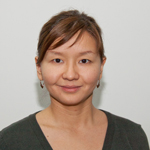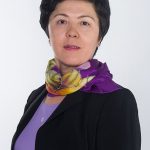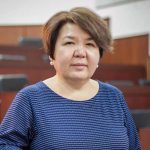The Public Administration program delivers international-standard education and research in public policy, administration, governance and financial management relevant to Kazakhstan and the Central Asian region.
At the program:
- You prepare yourself for a career in the public, non-profit, or private sector through an intellectual and practical interdisciplinary approach;
- You gain the analytical and practical skills needed to be a successful researchers, policymaker, or manager able to adapt to changing demands within different sectors;
Our Faculty
Our faculty at KIMEP are comprised of experienced international and Kazakhstani educators with doctoral degrees from world-class universities in Western countries such as the USA, Canada, the Netherlands, and the United Kingdom. All faculty members are research active and publish extensively in high-level international journals.
National ratings and International accreditation
- Top-ranked for “Public and Municipal Administration” programs starting from 2016 till present by the National Ranking of Educational Programs: Bachelor Programs (IQAA RK) Administration” in 2016.
- The only Public Administration bachelor program in Central Asia accredited by the European Association of Public Administration Accreditation (EAPAA)
- As a student of the Program you get an internationally accredited degree confirmed by the Foundation for Business Administration Accreditation (FIBAA), Germany
Membership in International organizations
The National Association of Schools of Public Affairs and Administration (NASPAA), the Network of Asia-Pacific Schools and Institutes of Public Administration and Governance (NAPSIPAG), International Association of Schools and Institutes of Administration (IASIA) and the Network of Institutes and Schools of Public Administration in Central and Eastern Europe (NISPAcee).
Study abroad opportunities
One- or two-semester exchange programs with many international partner universities offer students the opportunity to discover the world. Credits earned abroad count towards KIMEP degrees.
To earn a Bachelor Public and Municipal Administration a student must complete 146 credits/240 ECTS.
| Credits | ECTS | |
| General Education Requirements | 36 | 56 |
| Program Foundation Requirements | 68 | 112 |
| Program Required Courses | 36 | 60 |
| Final Attestation | 6 | 12 |
| Total Required for Graduation | 146 | 240 |
Students should choose the General Education courses with the assistance and advice of the academic advisors. The following are some guidelines for students in the BPMA program.
General Education Requirements can be found in the General Education section of the Catalog.
Program Foundation Courses (68 credits/112 ECTS)
Program Foundation Required Courses (32 credits/52 ECTS)
| Course Code | Course Title | Credits | ECTS | Prerequisites |
| KAZ2101
Or RUS 2101 |
Professional Kazakh Language
Or Professional Russian Language |
2 | 3 | |
| GEN1201 | Mathematics for Business and Economics | 3 | 5 | |
| ECN2103 | Principles of Microeconomics | 3 | 5 | All required GE English courses |
| PAF3531/ECN4121 | Public Finance/Public Economics | 3 | 5 | PAD2111 ECN2103 |
| ENG 1100 | Academic Speaking | 3 | 5 | |
| GEN 1121 | Academic Reading and Writing II | 3 | 5 | |
| ECN2103 | Introduction to Statistics | 3 | 5 | None |
| PAD2111 | Fundamentals of Public Administration | 3 | 5 | None |
| GEN/PAD 2700.2 |
Fundamentals of Sociology | 2 | 3 | GEN1100 and GEN1120 |
| GEN/POL 2701.2 |
Fundamentals of Political Science | 2 | 3 | GEN1100 and GEN1120 |
| GEN1704.2 /ECN1101.2 |
Introduction to Economics | 2 | 3 | GEN1100 and GEN1120 |
| PAD3115 | Academic Internship in Public Administration for BPMA | 3 | 5 | |
| Total | 32 | 52 |
Program Foundation: Elective Courses – for more information please consult with CSS Program Coordinator at css_coordinator@kimep.kz.
The Department of Public Administration offers the following majors (specializations) to students:
- Financial Management and Public Audit
- International Development and Public Policy
- Governance and Law
- International Trade and Corporate Policy
And the following minors:
Minor in International Development
Minor in Health Administration
Minor in Human Resource Management in the Public Sector
Minor in International Trade and Customs Administration
Minor in Public Sector Auditing
Minor in Taxation
ENG1110 Academic Listening and Note Taking (3 credits)
Prerequisites: ENG1100 Academic Speaking
Common European Framework: B2 to C1 low upon completion
The Academic Listening and Note-taking course develops students’ abilities in these two essential academic skills, while at the same time ensuring that listening is not a passive activity. Students improve their understanding of academic discourse in a variety of contexts, including lectures and less formal situations. They are exposed to a variety of dialects of English and levels of formality. They refine their note-taking skills and then use these notes as the basis for questions, responses and requests for clarification. In addition, their notes will be useful for revision and for developing essays, presentations and debates. Mere noting of facts will not be the primary goal. Rather, students will use their notes to write responses and develop their own critical thinking. As far as possible, authentic audio and video materials will be used in preference to the artificial materials specially prepared for such courses.
ENG1121 Academic Reading and Writing 2 (3 credits)
Prerequisites: ENG1120 Academic Reading and Writing I
Common European Framework: B2 to C1 low upon completion
This is an advanced-level academic reading and writing course, in which students undertake a major research project on an academic topic of their own choice. Building on the research and writing skills developed in previous courses, students select a project of substantial scope within an area of interest to them. They offer a sound defence of their choice of topic, using criteria appropriate to an academic context, and then prepare to undertake research. In preparing their research essays, students make extensive use of library and online resources, as well as field research such as interviews and off-campus research, depending on the nature of their topic. Reading tasks include finding, analyzing and evaluating a variety of sources. A process-approach to writing is adopted, with specific attention to planning, outlining, surveying the literature, drafting, rewriting, reviewing and using feedback constructively. Attention is paid to both peer and instructor feedback. At the final stage, editing, citations and bibliographical components are the focus of attention.
GEN1201 Mathematics for Business and Economics (3 Credits)
Prerequisites: ENG0004 Foundation English Level 4
The course develops the basic concepts of mathematical analysis used in economics and business with emphasis on differentiation and integration of single real-variable functions and matrix algebra. The approach to these concepts is intuitive and visual. The formal proofs are given only when they help in understanding concepts. Applications to economics, business and social science as well as computational realizations are studied.
ECN2083 Introduction to Statistics (3 Credits)
Prerequisites: GEN1201 (Not available to students who have credit for OPM2201 or STAT2101)
This course introduces the basic concepts of study design, data collection, data analysis and statistical inference. Topics include an overview of observational and experimental study designs; graphical and numerical descriptive statistics; probability distributions for simple experiments and for random variables; sampling distributions, confidence intervals, and hypothesis testing for the mean and proportion in the case of one sample. The emphasis is on developing statistical reasoning skills and concepts; computational skill is secondary. Students are taught the use of statistical software to handle the computations.
PAF 2211: Public Sector Marketing (3 Credits)
This course examines the relationship between marketing and organizational success in the public sector. It examines the impacts of public organizations on local, national and global economies. Topics covered include strategic marketing, developing a core marketing strategy, developing and launching new offerings, formulating and implementing communication strategies, and estimating and forecasting markets. Students learn to combine marketing strategies and tactics with the concepts of public service, public governance, and corporate social responsibility.
PAD3522 Decision Making (3 Credits)
Prerequisite: PAD2111
This course presents decision-making as a crucial part of strategic management. The course is intended to explain that decision-making is a complex process that involves understanding of constituent components. These components are presented in a logical sequence to students, together with analytical tools for decision-making. Decision-making pervades the entire administrative organization and planning process.
PAD3523 Human Resource Management (3 Credits)
Prerequisite: PAD2111
The purpose of this course is to provide students with an understanding of the principles and functions of human resources management and of personnel administration. It also reviews how organizations do or can deal with human resource management issues. Studying the ways that HRM issues are handled can help students who will be tomorrow’s managers be better prepared to create policies and procedures that will ensure effective use of human resources in organizations.
PAD3524 Leadership and Management (3 Credits)
Prerequisite: PAD2111
The course’s main objective is to help students develop personal leadership skills necessary in a challenging and fast-changing environment. The course combines both theoretical foundations and practical exercises on self-management, managing and building relationship with other people, and essentials of managing organizations.
PAD3533 Organization Theory and Design for Public Organizations (3 credits)
Prerequisite: PAD2111
This course is meant for students of public administration. This course focuses on the classical and modern aspects of organizations and the role of managers as leaders and facilitators of change. It aims to provide students with theoretical concepts and knowledge relevant to organizational design and management issues as well as opportunities to apply theories and knowledge to future organizational settings. This course deals with various perspectives on organizations, including a structural frame, human resource frame, political frame and symbolic frame.
PAD3113 Quantitative Data Analysis (3 Credits)
Prerequisites: None
The course focuses on quantitative principles and techniques of decision making and their application in public management, public administration and public policy analysis. The problems analyzed include frequency distribution, sampling techniques, and measures of central tendency, probability, variability, regression, measures of association, correlation, and various other applied quantitative measures. The course is designed for students with little or no background in mathematics: it does not focus on derivations and proofs, but rather on understanding the uses and interpretations of statistics as tools for data analysis. A second objective of the course is to introduce students to the utility of computer packages for statistical analysis.
PAD3116 Methods of Social Research (3 Credits)
Prerequisites: None
This is a basic foundation course designed to instruct students in methodological concepts of academic work. The course will provide students with an understanding of how researchers must operate at different stages in their projects simultaneously, how to understand academic problems, and how to manage the complexity this process entails.
PAD4443 Public Management (3 credits)
Prerequisite: PAD2111
The course aims to expose participants to current trends and developments in public management theory and practice and to teach students about public organizations and the challenges facing contemporary public managers. It explores new approaches and attempts to reform administration and management in government. We will learn about the evolution of the field of public administration, the way that public organizations differ from private organizations, how the “reinventing government” movement has affected public management and spawned counter-movements, and how public managers interact with other actors and institutions in the political process. There will be a specific focus on state and local government in Kazakhstan.
PAF3531 Public Finance (3 Credits)
Prerequisite: PAD2111
This course will examine economics of the public sector. It emphasizes government budget influences on distribution, resource allocation, stability, growth, expenditure, budgeting, and public choice. It will also study public goods, externalities, and social insurance. Students will use models to analyze real-world problems and programs.
PAD3542 Public Policy Analysis (3 Credits)
Prerequisite: PAD2111
This course presents a multi-disciplinary, multi-theoretical approach to understanding public policies in different areas such as health care, education, social welfare, crime, defense, environment, and economic and tax policy. The course will focus on a systematic analysis of public policy alternatives, factors, and processes involved in policy development. It will also examine questions about the content of governmental decisions, the factors that cause different policy-outputs, and the consequences of various governmental decisions.
PAD4442 Comparative Public Administration (3 credits)
Prerequisite: PAD2111
This course introduces students to the comparative aspects of contemporary public administration systems in a selected set of countries. Examples will be drawn from Continental-European, Anglo-Saxon and Asian models of public administration systems. Students will explore how various countries (developed, developing, and transitional) deal with multiple dichotomies in their respective public administrations: theory and practice, efficiency and fairness, secrecy and openness, and the most famous of all, politics and administration. Students will learn about various degrees of impact that politics, economics, culture and environment may have on the functioning of public administration institutions on central and local levels as well as on the relationships between politicians and bureaucrats.
PAD4520 Program Evaluation (3 Credits)
Prerequisite: PAD2111
The course is organized to provide students with an overview of the tools and techniques used to measure the activities, characteristics, effectiveness and efficiency of programs targeted towards specific populations. The primary objective of program evaluation is to provide feedback to decision-makers and other stakeholders, in order to determine whether a particular program is achieving desired outcomes at a reasonable cost. Students will be exposed to evaluation strategies and issues related to evaluation design. Students will develop and conduct a professional project evaluation of existing national and international projects in Almaty, including initiatives undertaken by different international organizations and local NGOs. Project evaluations will be conducted in groups of 3-4 students. Students will be accompanied and supervised throughout all stages of the evaluation process. No previous experience with evaluation research and empirical or qualitative data analysis is required.
PAF4534 Public Budgeting (3 credits)
Prerequisite: PAF 3511
This course is concerned with the practice of public agency budgeting in the decision making process and its impact on policy making. It will introduce participants to significant features of government budgeting topics, such as the role of budgeting in resource allocation, information and control, and various budget formats. Other topics include the budget cycle, the role of budgeting in enhancing social equity, budget analysis methodology, and introduction to theories of budgeting.
PAD4541 Gender and Public Policy (3 Credits)
Prerequisite: PAD 2111
The course looks at the negative and positive effects of public policy on gender relations in the family and the labor market. The reasons for gender differences in economic outcomes are discussed. Policies to promote gender equity are considered. The first part of the course focuses on the labor market and the gender wage gap. The second part of the course examines the family, with a particular focus on intra-household resource allocation. The final part of the course considers macro-economic issues. The course takes a comparative perspective on gender inequality in the labor market, drawing insights from developed, transitional, and developing countries.
Major in Financial Management
Major Required Courses
| Course Code | Course Title | Credits |
| PAD2111 | Theories of Public Administration | 3 |
| PAD4553.2 | Local Government (Municipal Management in GOSO) | 2 |
PAD2111 Fundamentals of Public Administration (3 Credits)
Prerequisites: None
The course provides students with basic concepts and models of public administration. It covers basic theories of public administration, some issues of public policy analysis, and certain tools of new public administration.
PAD4553 Local Government (2 Credits)
Prerequisite: PAD2111
The course is designed to provide students with an understanding of the political, institutional, and legal framework of local government activities. Students will be introduced to the concept of power decentralization. The focus will be on the process of decentralization in Kazakhstan, with regard to particular problems and constraints that local governments encounter.
Major Electives Courses (27 credits)
| Course Code | Course Title | Credits |
| PAD4556 | Senior Research Project | 3 |
| PAF4532.2 | Fiscal Governance (for Financial Management Major) | 3 |
| PAD3536 | Organizational Behavior (for Public Policy Major) | 3 |
| PAD3540 | Governance and Development (for Law and Governance Major) | 3 |
PAD3536 Organizational Behavior for Public Organizations (3 credits)
Prerequisite: PAD2111
This course is meant for students of public administration. This course will introduce students to the major concepts of organization theory and behavior. The course examines various theories developed in an attempt to explain and predict employee behavior in an organizational context. The primary focus of organizational behavior is leadership and decision making skills in an intercultural environment, power, job satisfaction, and motivation. The overall objective of this course is the development of skills and knowledge that will allow students to contribute in the managing of effective behavior in organizations.
PAD3540 Governance and Development (3 Credits)
Prerequisite: PAD2111
Radical global transformations are underway in industrial structures, business activities, production systems, and a new development ideology. To adapt to these diverse changes, developing countries must reconstruct their development policies. Development policies need a new vision of governance to harmonize global movements and diverse socioeconomic activities. The course is primarily aimed at introducing the students to the theoretical foundations of development and governance by acquainting them with the key schools of thought, debates, approaches, and issues. The focus is on bridging theoretical discourses with practical examples and learning. By the end of the course students are expected to develop a broad-based understanding of the key concepts, contexts, issues, and challenges surrounding the theoretical and practical discourses of development and governance both globally and nationally.
PAF4532.2 Current Topics in Public Financial Management: Fiscal Governance (3 Credits)
Prerequisite: PAF3511
Examination of public financial management topics currently being discussed in the media, and development of advanced analytical skills in those areas. Topics will change depending on the global environment and the implications of government decisions on global financial and economic issues.
PAD4556 Senior Research Project (3 Credits)
Prerequisites: Senior level standing
This course is offered as an alternative to the Internship in Public Administration. The course may be done within any career track or major area, but must cover some topics in Kazakhstan public administration or public policy, or a topic concerning the operation of a private business or NGO in Kazakhstan. The main purpose of the course is to familiarize students how to apply concepts of public and private organizational design and functioning – and to do so in some depth, culminating in a research paper of 20 pages of text. The student will go through the supervised steps of selecting, justifying, and focusing a topic and will use evidence and methods of research appropriate to his/her project. The course is conducted under the supervision a faculty member chosen in agreement by the student and PA Department. It ends with the student’s oral presentation of the project before a committee of PA faculty.
Major Electives in Financial Management
Following are the options from which 7 electives can be selected. Any 6 from the following
| Course Code | Course Title | Credits |
| PAF3534 | Taxation and Spending in Selected Countries | 3 |
| PAF4531 | Investment Management | 3 |
| PAF4532 | Current Topics in Financial Management | 3 |
| PAF4533 | Financial Management in the Public Sector | 3 |
| PAF4535 | Public Sector Auditing | 3 |
| PAF4536 | Project Appraisal and Management | 3 |
| PAF4532.4 | Managerial Accounting | 3 |
| PAF3532 | Government and Business | 3 |
PAF3532 Government and Business (3 Credits)
Prerequisite: PAD 2111
The course focuses on the role of government for supporting and enhancing private entrepreneurship. This includes identifying the industries in which government production of goods and services is necessary and industries in which government is not normally involved, and why. Topics also include ways and forms of government regulation of private business, antitrust policy and promotion of competition. Students will do case studies illustrating the rationale for government intervention in different sectors of the economy and will discuss the public policy toward development of private business.
PAF3534 Taxation and Spending in Selected Countries (3 Credits)
Prerequisites: PAD 2511, ECN2103 (or ECN1101)
This course will study both the theories of taxation and how various taxation concepts and approaches are used in different countries around the world. Some topics will focus on alternative ways of generating revenue, and how successful government is in doing this. Other topics will examine government spending programs in areas such as social insurance, education, and health care. Students will study the success and difficulties in implementation of different tax structures in different countries, including the United States, Canada, Kazakhstan, and other Central Asian countries.
PAF4531 Investment Management (3 Credits)
Prerequisite: PAF3511
Theory and practice of investment decisions of individuals and fund managers. Topics include capital market theory and the efficient market hypothesis literature. Standard institutional and investment analysis topics and international investment topics are also covered.
PAF4532 Current Topics in Public Financial Management (3 Credits)
Prerequisite: PAF3511
Examination of public financial management topics currently being discussed in the media, and development of advanced analytical skills in those areas. Topics will change depending on the global environment and the implications of government decisions on global financial and economic issues.
PAF4533 Financial Management in Public Sector (3 Credits)
Prerequisite: PAF3511
In this course students will study theory and practice of financial management in public and private organizations. Analysis of financial statements, pro forma statements, cost of capital, risk and return, capital budgeting, and other indicators of financial performance will be studied. Also, attention will be paid to socioeconomic aspects of financial management. Case studies may be employed where applicable.
PAF4535 Public Sector Auditing (3 credits)
Prerequisite: PAF 3511
The course introduces participants to the concepts and practices of performance auditing/assessment. Students will be provided with the knowledge and skills to determine whether a public organization is managing and utilizing its resources efficiently. They will be able to identify the causes of inefficiencies in public organizations and determine whether an agency has considered alternatives that might yield desired results at lower costs. Other topics include economy and efficiency assessments, effectiveness assessments, and introduction to financial auditing.
PAF4536 Project Appraisal and Management (3 credits)
Prerequisite: PAF3511
The main aim of this course is to provide an introduction to elementary techniques in project financial and economic analysis and their application to a range of public sector investment projects at different scales. During the course, agricultural, industrial and infrastructural projects will be considered with the emphasis upon practical decision-making with limited information and in the context of public goals and objectives.
PAF4532.2 Current Topics in Public Financial Management: Managerial Accounting (3 Credits)
Prerequisite: PAF3511
Examination of public financial management topics currently being discussed in the media, and development of advanced analytical skills in those areas. Topics will change depending on the global environment and the implications of government decisions on global financial and economic issues.
Plus any 1 from the following
| Course Code | Course Title | Credits |
| PAD3541 | Natural Resources Management | 3 |
| PAD3543 | Urban Development | 3 |
| PAD3540 | Governance and Development | 3 |
| PAD3547 | Social Policy in Transitional Countries | 3 |
| PAD 3548 | Health Care Policy | 3 |
| PAD4441 | Oil and Gas Policy | |
| PAD4542 | Current Issues in Public Policy and Administration | 3 |
| PAD4553.2 | Local Government | 2 |
PAD3540 Governance and Development (3 Credits)
Prerequisite: PAD2111
Radical global transformations are underway in industrial structures, business activities, production systems, and a new development ideology. To adapt to these diverse changes, developing countries must reconstruct their development policies. Development policies need a new vision of governance to harmonize global movements and diverse socioeconomic activities. The course is primarily aimed at introducing the students to the theoretical foundations of development and governance by acquainting them with the key schools of thought, debates, approaches, and issues. The focus is on bridging theoretical discourses with practical examples and learning. By the end of the course students are expected to develop a broad-based understanding of the key concepts, contexts, issues, and challenges surrounding the theoretical and practical discourses of development and governance both globally and nationally.
PAD3541 Natural Resource Management (3 Credits)
Prerequisite: PAD2111
This course is intended to provide students with critical frameworks for understanding problems in natural resource decision-making and use. An interdisciplinary approach to managing natural resources will be developed that will allow students to assess and utilize the types of information, expertise, and value-judgments that need to be considered in reaching a decision. Historical and current examples of resource use will be employed in order to reinforce the learning process. Essay topics of the students’ choice may be Kazakh or international.
PAD3543 Urban Development (3 credits)
Prerequisite: PAD2111
This course provides an overview of politics and policy-making for large cities and metropolitan areas. It dwells upon such issues as governmental strategies of reform; land-use planning and regulation; management and social impact of growth; transportation and the environment; citizen participation and development of local democratic institutions.
PAD3547 Social Policy in Transition Countries (3 Credits)
Prerequisite: PAD3542
The goal of the course is to provide students with an understanding of social issues involved in the transition from a centrally planned to a market economy. The course equips students with skills in analyzing the process of social policy formation and in evaluating current social policy conditions in transition economies, and gives them knowledge of the steps needed to move from an authoritarian to a civil society
PAD3548 Health Care Policy (3 Credits)
Prerequisite: PAD3542
This course is designed to instill an understanding of major health care policymaking and related issues. The course emphasizes history/background; the physical, social, and economic environment; the policy process; and the political marketplace of contemporary Kazakhstan health care policies.
PAD4441 Oil and Gas Policy (3 Credits)
Prerequisites: PAD2111
The course will examine the role of oil and gas in politics, including the types of regimes in which oil figures prominently, and will examine the ways in which government policies affect economic growth in these industries.
The course will pay special attention to the role of OPEC in world affairs, and to the growing influence of newly emerged oil powers, including the Caspian Sea region and Republic of Kazakhstan.
PAD4542 Current Issues in Public Policy and Administration (3 Credits)
Prerequisite: PAD3542
This course provides a scholarly perspective on public policy and administration that covers major theories associated with the field and the political, social, and economic context within which they are developed. The course will make a strong connection between the students’ professional development and a body of knowledge based on major theories and concepts of public policy and administration.
PAD4553.2 Local Government (2 Credits)
Prerequisite: PAD2111
The course is designed to provide students with an understanding of the political, institutional, and legal framework of local government activities. Students will be introduced to the concept of power decentralization. The focus will be on the process of decentralization in Kazakhstan, with regard to particular problems and constraints that local governments encounter.
Major Electives in Public Policy and Administration
Following are the options from which 7 electives can be selected. Any 6 from the following
| Course Code | Course Title | Credits |
| PAD3540 | Governance and Development | 3 |
| PAD3541 | Natural Resources Management | 3 |
| PAD3543 | Urban Development | 3 |
| PAD3547 | Social Policy in Transitional Countries | 3 |
| PAD3546 | Comparative Educational Policy and System Design | 3 |
| PAD3547 | Social Policy in Transition Countries | 3 |
| PAD3548 | Health Care Policy | 3 |
| PAD4441 | Oil and Gas Policy | 3 |
| PAD4542 | Current Issues in Public Policy and Administration | 3 |
| PAD4553.2 | Local Government | 2 |
| PAD4003 | Public Policy of Kazakhstan | 3 |
PAD3540 Governance and Development (3 Credits)
Prerequisite: PAD2111
Radical global transformations are underway in industrial structures, business activities, production systems, and a new development ideology. To adapt to these diverse changes, developing countries must reconstruct their development policies. Development policies need a new vision of governance to harmonize global movements and diverse socioeconomic activities. The course is primarily aimed at introducing the students to the theoretical foundations of development and governance by acquainting them with the key schools of thought, debates, approaches, and issues. The focus is on bridging theoretical discourses with practical examples and learning. By the end of the course students are expected to develop a broad-based understanding of the key concepts, contexts, issues, and challenges surrounding the theoretical and practical discourses of development and governance both globally and nationally.
PAD3541 Natural Resource Management (3 Credits)
Prerequisite: PAD2111
This course is intended to provide students with critical frameworks for understanding problems in natural resource decision-making and use. An interdisciplinary approach to managing natural resources will be developed that will allow students to assess and utilize the types of information, expertise, and value-judgments that need to be considered in reaching a decision. Historical and current examples of resource use will be employed in order to reinforce the learning process. Essay topics of the students’ choice may be Kazakh or international.
PAD3543 Urban Development (3 credits)
Prerequisite: PAD2111
This course provides an overview of politics and policy-making for large cities and metropolitan areas. It dwells upon such issues as governmental strategies of reform; land-use planning and regulation; management and social impact of growth; transportation and the environment; citizen participation and development of local democratic institutions.
PAD3546 Comparative Educational Policy and Systems Design (3 Credits)
Prerequisite: PAD3542
The purpose of this course is to enable public policy and teacher candidates to think critically about education as a social institution. The course may be useful for public policy designers, teachers, educational administrators, workers in international institutions, workers in science and industrial policy, consultants in vocational and human resource development or retraining, and for social reformers. The course focuses on Western Europe and North America, the CIS and Eastern Europe, and Central Asia.
PAD3547 Social Policy in Transition Countries (3 Credits)
Prerequisite: PAD3542
The goal of the course is to provide students with an understanding of social issues involved in the transition from a centrally planned to a market economy. The course equips students with skills in analyzing the process of social policy formation and in evaluating current social policy conditions in transition economies, and gives them knowledge of the steps needed to move from an authoritarian to a civil society
PAD3548 Health Care Policy (3 Credits)
Prerequisite: PAD3542
This course is designed to instill an understanding of major health care policymaking and related issues. The course emphasizes history/background; the physical, social, and economic environment; the policy process; and the political marketplace of contemporary Kazakhstan health care policies.
PAD4441 Oil and Gas Policy (3 Credits)
Prerequisites: PAD2111
The course will examine the role of oil and gas in politics, including the types of regimes in which oil figures prominently, and will examine the ways in which government policies affect economic growth in these industries.
The course will pay special attention to the role of OPEC in world affairs, and to the growing influence of newly emerged oil powers, including the Caspian Sea region and Republic of Kazakhstan.
PAD4542 Current Issues in Public Policy and Administration (3 Credits)
Prerequisite: PAD3542
This course provides a scholarly perspective on public policy and administration that covers major theories associated with the field and the political, social, and economic context within which they are developed. The course will make a strong connection between the students’ professional development and a body of knowledge based on major theories and concepts of public policy and administration.
PAD4553.2 Local Government (2 Credits)
Prerequisite: PAD2111
The course is designed to provide students with an understanding of the political, institutional, and legal framework of local government activities. Students will be introduced to the concept of power decentralization. The focus will be on the process of decentralization in Kazakhstan, with regard to particular problems and constraints that local governments encounter.
PAD4003 Public Policy of Kazakhstan (3 Credits)
Prerequisite: PAD 3542
This course begins with a discussion of social prerequisites for and governmental strategies of national development, with reference to managerial versus liberal modernizing approaches. Reference is made to the historical, economic, and social origins of public policies in Kazakhstan. The course then proceeds to an examination of the main challenges of national consolidation and institutional development facing the country.
Students will have the opportunity to work on a variety of topics such as nation-building, culture, and immigration policy; development of the public service; science, education, and labour policy; industrial and agricultural policy; information, broadcasting, and media; WTO accession, or other topics, depending on students’ interests and agreement with the instructor.
Plus any 1 from the following
| Course Code | Course Title | Credits |
| PAF3534 | Taxation and Spending in Selected Countries | 3 |
| PAF4531 | Investment Management | 3 |
| PAF4532 | Current Topics in Financial Management | 3 |
| PAF4533 | Financial Management in the Public Sector | 3 |
| PAF4535 | Public Sector Auditing | 3 |
| PAF4536 | Project Appraisal and Management | 3 |
| PAF4532.4 | Managerial Accounting | 3 |
| PAF3532 | Government and Business | 3 |
PAF3532 Government and Business (3 Credits)
Prerequisite: PAD 2111
The course focuses on the role of government for supporting and enhancing private entrepreneurship. This includes identifying the industries in which government production of goods and services is necessary and industries in which government is not normally involved, and why. Topics also include ways and forms of government regulation of private business, antitrust policy and promotion of competition. Students will do case studies illustrating the rationale for government intervention in different sectors of the economy and will discuss the public policy toward development of private business.
PAF3534 Taxation and Spending in Selected Countries (3 Credits)
Prerequisites: PAD 2511, ECN2103 (or ECN1101)
This course will study both the theories of taxation and how various taxation concepts and approaches are used in different countries around the world. Some topics will focus on alternative ways of generating revenue, and how successful government is in doing this. Other topics will examine government spending programs in areas such as social insurance, education, and health care. Students will study the success and difficulties in implementation of different tax structures in different countries, including the United States, Canada, Kazakhstan, and other Central Asian countries.
PAF4531 Investment Management (3 Credits)
Prerequisite: PAF3511
Theory and practice of investment decisions of individuals and fund managers. Topics include capital market theory and the efficient market hypothesis literature. Standard institutional and investment analysis topics and international investment topics are also covered.
PAF4532 Current Topics in Public Financial Management (3 Credits)
Prerequisite: PAF3511
Examination of public financial management topics currently being discussed in the media, and development of advanced analytical skills in those areas. Topics will change depending on the global environment and the implications of government decisions on global financial and economic issues.
PAF4533 Financial Management in Public Sector (3 Credits)
Prerequisite: PAF3511
In this course students will study theory and practice of financial management in public and private organizations. Analysis of financial statements, pro forma statements, cost of capital, risk and return, capital budgeting, and other indicators of financial performance will be studied. Also, attention will be paid to socioeconomic aspects of financial management. Case studies may be employed where applicable.
PAF4535 Public Sector Auditing (3 credits)
Prerequisite: PAF 3511
The course introduces participants to the concepts and practices of performance auditing/assessment. Students will be provided with the knowledge and skills to determine whether a public organization is managing and utilizing its resources efficiently. They will be able to identify the causes of inefficiencies in public organizations and determine whether an agency has considered alternatives that might yield desired results at lower costs. Other topics include economy and efficiency assessments, effectiveness assessments, and introduction to financial auditing.
PAF4536 Project Appraisal and Management (3 credits)
Prerequisite: PAF3511
The main aim of this course is to provide an introduction to elementary techniques in project financial and economic analysis and their application to a range of public sector investment projects at different scales. During the course, agricultural, industrial and infrastructural projects will be considered with the emphasis upon practical decision-making with limited information and in the context of public goals and objectives.
PAF4532.2 Current Topics in Public Financial Management: Managerial Accounting (3 Credits)
Prerequisite: PAF3511
Examination of public financial management topics currently being discussed in the media, and development of advanced analytical skills in those areas. Topics will change depending on the global environment and the implications of government decisions on global financial and economic issues.
Major Electives in Governance and Law
Following are the options from which 7 electives can be selected. Students are free to choose any 3 from the governance and any 4 from Law areas
Governance Area
| Course Code | Course Title | Credits |
| PAD4003 | Public Policy of Kazakhstan | 3 |
| PAD4553 | Government and Business | 3 |
| PAD4701 | Current Issues in Governance and Law | 3 |
| PAD4702 | CSR and International Development | 3 |
PAD4003 Public Policy of Kazakhstan (3 Credits)
Prerequisite: PAD 3542
This course begins with a discussion of social prerequisites for and governmental strategies of national development, with reference to managerial versus liberal modernizing approaches. Reference is made to the historical, economic, and social origins of public policies in Kazakhstan. The course then proceeds to an examination of the main challenges of national consolidation and institutional development facing the country.
Students will have the opportunity to work on a variety of topics such as nation-building, culture, and immigration policy; development of the public service; science, education, and labour policy; industrial and agricultural policy; information, broadcasting, and media; WTO accession, or other topics, depending on students’ interests and agreement with the instructor.
PAD4553 Local Government (2 Credits)
Prerequisite: PAD2111
The course is designed to provide students with an understanding of the political, institutional, and legal framework of local government activities. Students will be introduced to the concept of power decentralization. The focus will be on the process of decentralization in Kazakhstan, with regard to particular problems and constraints that local governments encounter.
PAD4702 CSR and International Development
The course examines corporate social responsibility (CSR), which is one of numerous development challenges today. An overview of corporate social responsibility (CSR), focusing on today’s interplay between business and governments, intergovernmental institutions, investors and non-governmental organizations (NGOs) is provided. The course examines both theoretical and real-world cases of CSR and development as well as various topics including global initiatives on CSR and CSR in Kazakhstan. This course is in a seminar format and students are expected to participate actively in class discussions and activities.
Other electives:
PAD2700 Introduction to Sociology (3 Credits)
Prerequisites: None
The course provides students with the necessary background needed to analyze social structures and social institutions. Emphasis is placed on building sociological perspectives and a comprehensive understanding of sociology as an academic discipline. The course covers various theoretical paradigms and concepts in the field of sociology.
PAD3115 Professional Internship in Public Administration (7 credits)
Prerequisite: PAD2111
Internships are aimed at practical application of public administration studies, development of professional skills and acquiring work experience. They are available in a wide range of public agencies and non-profit organizations. These high quality professional internships are tailored to suit your needs whether it is a requirement for university, a desire to experience another culture, broaden your horizons or expand your career opportunities.
PAD4521 Current Issues in Public Management
Prerequisite: PAD2111
This course discusses government reform and modernization efforts across the world. It deals with the most common areas in need of reform and innovation such as civil service, regulation, service delivery, and corruption control. It looks at innovations that involve the use of information technology, performance management, and competition to improve the effectiveness and efficiency of government. Many concepts now in use in public sector management borrowed from the private sector. How they apply and conceptualize in a public sector context is an important part of this course.
PAF3511 Fundamentals of Public Financial Management (3 Credits)
Prerequisite: PAD2111
This course provides students with a conceptual understanding of the financial decision-making process made in public sector enterprises. With a focus on the big canvass, the course provides a foundation to financial decision-making rooted in current financial theory and in the present state of world economic conditions. The goal of this course is not merely to teach a discipline or trade but also enable students to understand what is learned and yet unforeseen problems—in short, to educate students in public financial management issues such as administration and management of Government’s financial affairs, allocation, investment, control of public funds, and public budgeting.
CSS 3001.1 Introductory Internship (Kazakhstan Parliament) Foundation Course (3 credits)
Prerequisite: PAD2111
CSS3001.2 Introductory Internship (Kazakhstan Parliament) (3 credits)
Prerequisite: CSS3001.1
The internship is designed to provide the student with an experiential learning opportunity by placing the individual in the Parliament of Kazakhstan
CSS 3002.1 Introductory Internship (Ministry of Economics) Foundation Course (3 credits)
CSS3002.2 Introductory Internship (Ministry of Economics) (3 credits)
PAD4562 Current Issues in Governance and Law
The course examines current trends and innovations that are relevant in enhancing societal development in areas of public governance, public administration and the enactment and development of legal frameworks in furtherance of good governance. Case studies and the use of information technology may be applied.
Scholarship opportunities
There are many merit-based scholarship opportunities for Kazakhstani and international students.
While studying at KIMEP University, students may also apply for part-time positions available on the University campus.
If you would like to apply for a scholarship, contact the Office of Financial Aid. .
Tuition & Fees
Study abroad opportunities
One- or two-semester exchange programs with many international partner universities offer students the opportunity to discover the world. Credits earned abroad count towards KIMEP degrees.
Innovations
We are proud to announce a new course “Model UN” in collaboration with UN Kazakhstan starting from Spring 2017 semester.
Graduates have a high employment rate and work in a wide range of areas such as:
- National and local government
- International and Kazakhstani business corporations
- International and local NGOs
- United Nations
- Foreign services and embassies
- Administration in the public and private sectors
- Public finance and management
- Public and business relations management
Our Alumni include the Vice President of Air Astana; the Director for Onshore Projects, Kazakh Institute of Oil and Gas; the Director of the Development Department at the Almaty Regional Financial Center Rating Agency (RFCA); Audit Partners of KPMG Audit; Leading Expert-Economists in the National Bank of the Republic of Kazakhstan, Samruk Kazyna, PWC, Deloitte and others.

Xiaotong Zhang
Professor, Department of International Relations and Regional Studies /College of Social Sciences and Director of China and Central Asian Studies Center (CCASC – www.ccasc.kz)
More:
Education:
Ph.D., Political Science at Université Libre de Bruxelles
Most significant publications in the last 5 years:
- Zhang Xiaotong, Colin Flint, ‘Why and Whither the US-China Trade War?: Not Realist ‘Traps’ but Political Geography ‘Capture’ as Explanation’, (2021), 55, Journal of World Trade, Issue 2, pp. 335-358
- Colin Flint and Zhang Xiaotong, “Historical–Geopolitical Contexts and the Transformation of Chinese Foreign Policy”, The Chinese Journal of International Politics, 2019, 1–38
- “From Wealth to Power: China’s New Economic Statecraft”, The Washington Quarterly, Spring Issue, 2017
Some facts from Dr. Zhang’s employment history
Full Professor, Institute of Belt and Road Initiative & Global Governance, Fudan University, Shanghai, China, 2020-
Full Professor, School of Political Science and Public Administration, Wuhan University, Wuhan, China, 2016-2020
Associate Professor, School of Political Science and Public Administration, Wuhan University, Wuhan, China, 2012-2016
Vice Dean, Institute of International Studies, Wuhan University, Wuhan, China, 2017-2020
Executive Director, Wuhan University Centre for Economic Diplomacy, Wuhan, China, 2013-2020
Executive Director, the Joint Research Centre for Caribbean Studies between Wuhan University and the University of the West Indies – St. Augustine Campus, 2015-2020
Deputy Director, US Desk, Ministry of Commerce, China, 2010-2012

Dilara Orynbassarova
Assistant Professor, Department of International Relations and Regional Studies, College of Social Sciences
More:
Dilara Orynbassarova is an Assistant Professor in the College of Social Sciences at KIMEP University.
Dr.Dilara Orynbassarova obtained her Ph.D. in Education with distinction from Graduate School of Education, Nazarbayev University. She completed her BSS and MPA degrees with diploma of excellency at KIMEP university.
She served on academic and research activities at the Nazarbayev University, University of Pennsylvania (USA), KIMEP University and the Eurasian Research Institute. She also headed division for analysis and quality in the Independent Agency for Quality Assurance in Education, served in the Office of Prime Minister of Republic of Kazakhstan, Department of Informational Analytic Center (traineeship) and Center for Research and Consulting.
Dr. Dilara teaches course on Introduction to Social Sciences at KIMEP. The courses co-taught and assisted elsewhere include Communication and Society, World Prehistory, Professional Identity, Learning to Work, Academic Writing for Doctoral Students, English for Research.
Her current research interests include innovation in higher education system and policy, multi-stakeholder and cross-sector partnerships, and social network analysis.
E-mail: d.orynbassarova@kimep.kz
Publications:
- “Delivering Environmental Education in Kazakhstan Through Civic Action: second-wave values and governmental responses,” Environmental Values, 1, (2013), 101-122, with Dennis Soltys, UK, Harris
- “Family Medicine as a Model of Primary Health Services Delivery: A Pilot Study in Almaty, Kazakhstan”, Central Asian Journal of Global Health, 4 (1), (2015), USA, University of Pittsburgh Press (Master Thesis Publication, USA, University of Pittsburgh) (Indexedin PubMed and Emerging Sources Citation Index (ESCI) of the Web of Science)
- “Entrepreneurial University Perspective: Tracking Labor Force Capacity to Support Industrialization Processes in the Emerging Markets, Evidence from Kazakhstan Data”. EMAJ: Emerging Markets Journal 6(2), (2016), 5-11. USA, University of Pittsburgh Press. (Indexed in DOAJ, WorldCat)
- “Teacher Education Research in Central Asia: An Analysis of Journal Publications (2006-2016), The Case of Kazakhstan”. Eurasian Research Journal, 2(1), (2020), 81-95.
Conference proceedings
- “Developing University-Industry-Government Research Partnerships in Republic of Kazakhstan: factors enhancing and constraining”. Jun 15, (2020).The Proceedings of the 18th Triple Helix Conference. Future of innovation and Innovation for future online. Finland, Tampere University, 21-23.
- “Modernization of Teacher Education in Kazakhstan: Experience of Finland”. Asyavrupa, 4 (46), (2019), 71-77.
- “Teacher Education in the Context of Transformation Processes in Kazakhstan: Challenges and Perspectives”, Sep 19, (2017). The Collection of the International Conference on Institutionalization of Innovative Education Environment of High Pedagogic School, Kazakhstan, Pavlodar, Ministry of Education and Science of Kazakhstan and National Pedagogic Institute of Pavlodar.
- “Policy Reception of Cascade In-Service Teacher Education Model in Kazakhstan through the Lens of Policy Borrowing Theory”, Jun 15-16, (2017), 340 (142), 79-84 The Collection of IV International Scientific-Practical Conference on Science and Education in Globalization Processes, Russian Federation
- “Developing Research Competence Through a Student-Run Peer-Review Journal at Higher Education Institutions of Kazakhstan”, May 19-20, (2017), The Collection of the II-nd Annual Conference on Academic Integrity and University Governance, Kazakhstan, Astana, with Philip Montgomery, Anna CohenMiller and Kamila Kozhabayeva, KAZGUU University and Nazarbayev University.
- “Guidelines for Writing a Book Review: Through the Lens of a First-Year Doctoral Student”. NUGSE Research in Education Journal, 2 (1), (2017), 43-44, Nazarbayev University, Editorial.
- “A Comparative Study of Teacher Attitudes toward Inclusion in Kazakhstan and Turkey: A Literature Review”, (2017),2-16, Preprints of the Eurasian Research Institute for Social and Cultural Studies, Eurasian Research Institute, ERI Working Papers.
- “New Methods and Approaches in Modernizing the Continuous Professional Development of Teachers in the World’s Practice: the case of Finland”, Feb 23, (2017), 15-20, The Collection of the International Scientific-Practical Conference on Continuous Professional Development of Teacher: From High School To Post-Graduate Education, Kazakhstan, Petropavl, National Centre for Professional Development ‘Orleu’ in the North-Kazakhstan region and Institute of Increasing Teachers’ Qualifications and Professional Skills.
- “Putting inclusive principles into practice: teacher attitude and education as factors impacting inclusive education development”, Vol.1, No. 94 (Nov-20, 2015), p 234, The Collection of the II-nd International Scientific and Practical Conference: “Innovations in Education: Research and Solutions”, Kazakhstan, Astana, published by Ministry of Education and Science of Republic of Kazakhstan, National Academy of Education named after Y.Altynsarin and Ural State Pedagogical University.

Ulzhan Kazybekova
PhD, Assistant Professor Department of International Relations and Regional Studies
More:
Education:
PhD in Sociology, The Nottingham University, United Kingdom, 2017
MA in Public Administration, The Nottingham University, United Kingdom, 2009
Bachelor of Public Administration, KIMEP, Kazakhstan, 2008
Courses Taught at KIMEP
Introduction to Social Science; Nutrition in Modern World
Courses Taught Elsewhere
Sociology, Political Science, Cultural Studies, Research Design in Social Policy, The Management Support of Youth Policy, Psychology Management
Research interests:
Gender Inequality, Leadership, Motivation, Education policy
Publications:
- Bugytayeva, S. and Kazybekova, U. (2022). The South Korean component in the doctrines of the United States Presidents (1945-2022). Public Administration and Civil Service journal. Academy of Public Administration under the President of the Republic of Kazakhstan. No 3 (82).
- Polozhentseva, Y., Kazybekova, U., Subalova, M., and Ghosh, A. (2022). We or I? Survival and Success Challenges Jokeasses. Emerald Emerging Markets Case Studies, Vol. 12 No.1.
- Kazybekova U. (2014). Presented the paper on “Working mothers’ understanding of the shift from state to non-state pension provision” (Conference Stream: Negotiating Access to Research Participants) at the 7th Enquire Conference “4D Research: Early experiences of Designing, Debating, Doing and Disseminating Social Research”, The University of Nottingham, School of Sociology and Social Policy, 14th November 2014.
- Kazybekova U. (2013). Presented the paper on “Understanding of working mothers of the shift from state to private pension provision” at the 6th Enquire Conference “Normality in an Uncertain World”, The University of Nottingham, School of Sociology and Social Policy, 10th-11th September 2013.
- Kazybekova U. (2012). New model of educator’s personality in the educational system. Collection of materials of Republican Scientific Conference. “Spiritual and moral component in the triad of education-science-innovation”, Almaty, May 18, 2012, Kazakh Ablai Khan University of International Relations and World Languages.
Contact information:
Office: # 231 Valikhanov building
E-mail: u.kazybekova@kimep.kz

David Porter
David Porter is an Assistant Professor at the Economics Department….
More:
David Porter is an Assistant Professor at the Economics Department. He has obtained his PhD degree in Economics from the University of Georgia, USA.
In January 2021, he joined Florida Gulf Coast University (FGCU ) in Fort Myers, Florida and taught numerous sections of ECO 2023 Microeconomics, both in-person and online, to more than 600 students as a Visiting Instructor. Since 1999, Dr. Porter has been employed in the energy sector as electricity load forecaster, tariff rate forecaster (Enron Energy Services), real-time electricity trader (Enron and Nextera), financial trader (Nextera) and proprietary speculative trader for numerous firms. He has an extensive background in Financial Economics and Monetary Economics dealing with foreign exchange, option pricing, swaps, collars and derivatives.
Dr. Porter joined KIMEP University from the Spring 2023 semester, he is currently teaching “Monetary Economics”, “Money and Banking” and “Financial Management Institutions” courses.
Scholarly Research Papers Published in Peer-reviewed Journals
The Demand for residential, industrial and total electricity, 1973-1998. Kamerchen, D.R. and Porter, D.V., Energy Economics, 26 (1), p.87-100, Jan 2004
- Peer reviewed journal article I co-authored has been used in MIT Graduate Energy Economics course since 2007.
- https://ocw.mit.edu/courses/economics/14-44-energy-economics-spring-2007/readings/
- 266 citations according to Google Scholar.
Market Structure in the US Electricity industry: A long-term perspective. Kamerschen, D.R., Klein, P.G. and Porter, D.V., Energy Economics, 27 (5), p.731-751, Sep 2005
Contact information: d.porter@kimep.kz

Alen Askar
Alen Askar is a Ph.D. candidate in Eurasian Studies at…
More:
Alen Askar is a Ph.D. candidate in Eurasian Studies at Nazarbayev University. He is finishing his dissertation on the history of Tselinograd during the 1950s and 1960s in the context of building an ideal socialist city. His research interests revolve around the history of the Muslim population in the early twentieth-century Russian Empire, memory studies, and historical politics.
In addition to his research pursuits, Alen Askar offers courses on the History of Kazakhstan. Recently, he joined the KIMEP team in Spring 2023 as a senior lecturer. If you would like to contact him, you can do so via email at a.askar@kimep.kz

Aslan Tanekenov
(Kazakh) Әлеуметтік ғылымдар факультетінің мемлекеттік басқару кафедрасының ассистент-профессоры
More:
Assistant Professor, Department of Public Administration, College of Social Sciences
Dr. Tanekenov obtained his PhD degree from Heriot-Watt University, UK and MPhil degree from University of Glasgow, UK. His research interests are International civil society organizations; social enterprise, empowerment of socially vulnerable people; cross-sector partnership; volunteering, philanthropy, NGO management.

Dennis Soltys, Ph. D. in Political Science
Adjunct Professor,
Department of Public Administration/College of Social Sciences
More:
Professor Dennis Soltys obtained his PhD from the Department of Political Science, University of Toronto.
He has served on many KIMEP committees, especially concerning accreditations and quality assurance, and is currently the chair of the Department of Public Administration and International Development.
In his 15 years at KIMEP Dr. Soltys has taught a wide variety of courses, including graduate courses in research methods and thesis-writing, public policy of Kazakhstan, comparative education policy, and organization theory. He has publications in top international journals such as Journal of Central Asia, Comparative Education, International Journal (Canada) and Foreign Policy (USA), complemented by numerous conference papers published in Kazakhstan.
His main research interests include the cultural foundations and systemic design of public education in developed and transitional countries, development of civil society in transitional countries, and the public policy of Kazakhstan.
Email: dsoltys@kimep.kz
Tel. (727) 270-4303
Research and Publications:
Soltys, D. (2017). Social transformation with conflict avoidance in Ukraine between the maidans of 2004 and 2014. Post-Soviet Affairs, USA, (submitted, September, 2017).
Soltys, D. (2017). The central role of humanities and social sciences education in powering economic innovation. Vcheni zapysky (Scientific Notes), Kyiv, (forthcoming, July 2017).

Milen Nikolaev Filipov
Assistant Professor, Department of Media and Communication/College of Social Sciences
More:
Research and Publications:
Filipov. M. et. al. (2017). Do Bulgarian Schools Effectively Communicate with Their School Communities? Journal of School Public Relations, 37(2):163-202.
Filipov. M. (2016). Media Release – A Basic Genre in Public Relations. Journal of Contemporary Humanitaristics, 2016(1): 7-18. (co-authorship with Galya Hristozova).

Aigerim Kalybay, Ph. D.
Professor, Department of Economics/College of Social Sciences
More:
Aigerim Kalybay is an Associate Professor at the Department of Economics. After graduating from L.N. Gumilyov Eurasian National University in 1998 she received a research fellow position at the Institute of Mathematics of the Academy of Sciences of the Republic of Kazakhstan. She worked at the Institute of Mathematics for six years, during which in 2002 she attained the degree of Candidate in Physical and Mathematical Sciences. In 2004 she received a grant from the Royal Swedish Academy of Sciences for a two-year postgraduate study at the Luleå University of Technology, where she defended her PhD Thesis in 2006. In the same year she joined KIMEP.
Please also update
Courses taught: Mathematics for Business and Economics, Introduction to Statistics, Calculus, Quantitative methods for Economics, Quantitative Data Analysis, Statistical methods.
Selected Publications:
- A. Kalybay, “One-dimensional differential Hardy inequality”, Journal of Inequalities and Applications, 2017, 2017:21; http://dx.doi.org/10.1186/s13660-017-1293-3 (Published: January 2017).
- A. Kalybay, D. Karatayeva, R. Oinarov, A. Temirkhanova, “Oscillation of a second order half-linear difference equation and the discrete Hardy inequality”, Electronic Journal of Qualitative Theory of Differential Equations, # 43, 2017, 1-16; doi: http://dx.doi.org/10.14232/ejqtde.2017.1.43 (Published: May 2017).
- A. Kalybay, S. Shalginbayeva, “Additive estimates for discrete Hardy-type operators”, Eurasian Mathematical Journal, Vol. 9, #2, 2018, 44-53 (Published: June 2018).
- A. Kalybay, R. Oinarov, “Kernel operators and their boundedness from weighted Sobolev space to weighted Lebesgue space”, Turkish Journal of Mathematics, Vol. 43, 2019, 301-315; http://dx.doi.10.3906/mat-1807-187 (Published: January 2019).
- A. Kalybay, R. Oinarov, A. Temirkhanova, “Integral operators with two variable integration limits on the cone of monotone functions”, Journal of Mathematical Inequalities, Vol. 13, #1, 2019, 1-16; http://dx.doi.10.7153/jmi-2019-13-01 (Published: March 2019).
- A. Kalybay, R. Oinarov, “Estimates of a class of quasilinear integral operators on the set of nonnegative and nonnegative-monotone functions”, Izvestiya: Mathematics, Vol. 83:2, 2019, 61–82; http://dx.doi.org/10.4213/im8613 (Published: March-April 2019).
- A. Kalybay, “Weighted estimates for a class of quasilinear integral operators”, Siberian Mathematical Journal, Vol. 60, # 2, 2019, 291–303; http://dx.doi.org/10.1134/S0037446619020095 (Published: March-April 2019).

Kanat Kudaibergenov, Doctor of Science
Adjunct Professor, Department of Economics/College of Social Sciences
More:
Research and Publications:
Kudaibergenov, K., (2016). On model-theoretic properties in the sense of Peretyat’kin, o-minimality, and mutually interpretable theories. Siberian Advances in Mathematics. ISSN: 1055-1344, vol. 26, No. 3, 190 – 195.
Kudaibergenov, K. (2017). The small index property and the cofinality of the automorphism group. Siberian Advances in Mathematics. ISSN: 1055-1344, vol. 27, No. 1, 1 – 15.

Kristopher White, Ph.D. Geography
Associate Professor, Department of Public Administration/College of Social Sciences
More:
Faculty Profile
- Kristopher D. White
- Associate Professor
- D. Geography, (2002) University of Connecticut
MA Geography, (1996) University of Connecticut
BA Geography, (1992) Clark University
- Teaching Experience: Has been at KIMEP since 2004
Stephen F. Austin State University (Nacogoches, Texas) (2001-2004)
University of Connecticut (Storrs, Connecticut) (1998-2001)
- Classes taught at KIMEP:
Globalization and Diversity
Population and Environment
Human Geography
The Aral Sea Crisis: A Geographical Perspective
Political Geography
Ecology and Sustainable Development
Oil Geopolitics (Graduate seminar)
Oil and Gas Policy
Introduction to Environmental Studies
Digital Photography
Photojournalism
Natural Resource Management and Economics
Research Reading and Writing
- Research Interests:
Geography of Central Asia, Kazakhstan. Regional economy, Aral Sea region, Aral Sea crisis and contemporary socio-economic development in Aral Sea region. .
- Selected Recent Publications
White, K.D. and Micklin, P. 2021. Ecological restoration and economic recovery in Kazakhstan’s Northern Aral Sea region. Focus on Geography 64: doi: 10.21690/foge/2021.64.4f.
White, K.D. 2021. Population, Development, and Environment in Kazakhstan. In: McNicol, B. ed. Sustainable Planet: Issues and Solutions for Our Environment’s Future. Santa Barbara, CA: ABC-CLIO, pp. 29-37.
Micklin, P., Aladin, N.V., Chida, T., Boroffka, N., Plotnikov, I.S., Krivonogov, S., and White, K. 2020. The Aral Sea: A story of devastation and partial recovery of a large lake. In: Mischke, S. ed. Large Asian Lakes in a Changing World: Natural State and Human Impact. Switzerland AG: Springer Nature, pp. 109-141.
White, K.D. 2019. Environmental Issues in Kazakhstan. In: Farazmand, A. ed. Global Encyclopedia of Public Administration, Public Policy, and Governance (Switzerland: Springer Nature).
White, K.D. 2019. Visualizing the languages of nature, society, power and politics in contemporary Kazakhstan. In: Brunn, S.D and Kehrein, R. eds. Handbook of the Changing World Language Map (New York: Springer Nature).
White, K.D. 2018. The snow leopard and cultural landscape in contemporary Kazakhstan. Society and Animals 26: 1-23.
Koch, N. and White, K. 2016. Cowboys, gangsters, and rural bumpkins: Constructing the ‘other’ in Kazakhstan’s ‘Texas.’ In: Laruelle, M. ed. Kazakhstan in the Making: Legitimacy, Symbols, and Social Changes. Lanham: Lexington Books, pp. 181-207.
White, K.D. 2016. Kazakhstan’s Northern Aral Sea today: Partial ecosystem restoration and economic recovery. In: Freedman, E. and Neuzil, M. eds. Environmental Crises in Central Asia: From steppes to seas, from deserts to glaciers. London and New York: Routledge, pp. 129-140.
White, K.D. 2014. Nature and Economy in the Aral Sea Basin. In: Micklin, P., Aladin, N., and Plotnikov, I. eds. The Aral Sea: The devastation and partial rehabilitation of a great lake. Berlin Heidelberg: Springer-Verlag, pp. 301-335.
White, K.D. 2013. A geographical perspective on the Aral Sea crisis: Three interpretations of an image. Bulletin of Geography Socio-economic Series 21: 125-132.
White, K.D. 2013. Nature-Society Linkages in the Aral Sea Region. Journal of Eurasian Studies 4(1): 18-33.

Aliya Nurtaeva, Ph. D. in Chemistry
Adjunct Professor, Department of Public Administration/College of Social Sciences
More:
Dr. Nurtaeva holds an Honors Diploma (1974) and Candidate of Science degrees in Chemistry from Moscow State University (1979 and a Ph.D. in Chemistry from Oklahoma State University (1999). She has more than 30 years of teaching experience including at Al-Farabi Kazakh National University, Oklahoma State University, New Hamphire Technical College, Southern New Hampshire University. She has done research in Chemistry, Technology and Radiation Dosimetry at KazGU, Moscow State University, Oklahoma State University and the Armed Forces Radiobiology Research Institute at National Naval Medical Center in Bethesda (USA) and registered 17 patents.

Nurseit Niyazbekov, Ph. D. Politics
Assistant Professor, Department of International Relations and Regional Studies/College of Social Sciences
More:
Dr Nurseit Niyazbekov is an assistant professor in the Department of International Relations in KIMEP University in Almaty, Kazakhstan. He is researching and consulting various international media and think tanks in the areas of post-communist transitions, democratization, Central Asian state building and protest mobilization. He was a visiting research fellow at the University of Michigan and SciencePO. He obtained his PhD and MSc degrees in Politics and Sociology from the University of Oxford.

Nadeem Naqvi, Ph. D.
Professor, Department of Economics/College of Social Sciences, College of Social Sciences
More:
Research and Publications:
Naqvi, N., & Egbert, H. (2015). Market-Dependent Domestic Production Set. Journal of Economics and Finance Education, 14 (1), 31-40
Naqvi, N. (2017). Production Possibility Frontier: New Concepts for Post-Crisis Economics Textbooks in Ploehn, Juergen and George Chobanov (Eds.), Sustainability and Welfare Policy in European Market Economies, Peter Lang, pp 11-12.

Gerald Pech, Doctorate of Economics
Associate Professor, Department of Economics/College of Social Sciences
Dean, College of Social Sciences
More:
Gerald Pech held teaching and research positions at the Graduate School Bochum and Dortmund, the University of St Andrews, National University of Ireland in Galway, American University in Bulgaria and Johannes-Gutenberg University Mainz. His fields of specialization are game theory, public economics and the economic analysis of institutions.

Francis Amagoh, Ph. D. in Public Policy and Administration
Professor, Department of Public Administration/College of Social Sciences
More:
Research and Publications:
Amagoh, F. (2017). Healthcare in Kazakhstan in The Future of Healthcare in Developing Countries in Asia( Eds. C. Aspalter and K. Pribadi). London: Routledge/Taylor & Francis.
Amagoh, F., & Rahman, T. (2016). Tapping into the Potential of Academic Diaspora for Homeland Development: The Case of Nigeria. Journal of International Migration and Integration .Vol. 17 No. 1, 35-53.

Nygmet Ibadildin, Ph. D. in Political Science and International Relations
Chair of the Department of International Relations and Regional Studies, Department of International Relations and Regional Studies/College of Social Sciences
More:
Nygmet Ibadildin graduated in 1995 from Kazakh State University with major in Philosophy. He made his Master of Arts in International relations in California State University at Fresno. He defended his PhD dissertation in 2011 in University of Tampere, School of Management. Title of dissertation is Role Of New And Old Institutional Framework In Combating The Resource Curse In Kazakhstan”. Dissertation grade is Magna cum laude approbatur.
He was editor and journalist in the Energy of Kazakhstan magazine and in the newspaper Vremya Po form 1999-2002.
Worked in different schools in Kazakhstan and abroad.
Research interests are political economy of natural resources, institutional development, Post-Soviet institutions and discourse analysis.
Currently teaching in KIMEP University, Almaty, Kazakhstan.
Research and Publications:
Ibadildin, N. (2012). Role of institutions in Kazakhstan in combating the resource curse: Transition from the Soviet legacy to something else. London: Lambert Academic Publishing.
Ibadildin, N. (2009). Oil and Authoritarianism in Kazakhstan, in Ostrov, B. (Ed.) From Silk Road to Oil Slick: Kazakhstan Reemergence to Modernity. Norwalk: EastBridge.
List of Publications
Charles McGrath, Nygmet Ibadildin. Kazakh Famine 1928-1932. Publication date.2018/5. Journal Ukrainian Policymaker, Volume 2, 2018: 12-19 DOI: 10.29202/up/2/2
Ken Harvey and Nygmet Ibadildin. Handbook of Research on Human Social Interaction in the Age of Mobile Devices, scheduled for publication in 2016 by IGI Global, Chapter Mobile Impacting All Phases of Business IGI Global 2016
Ken Harvey and Nygmet Ibadildin. Business and mobile: Rapid restructure required June 2016 DOI: 10.4018/978-1-5225-0469-6.ch014
Нефть и политика. Мировой опыт и Казахстан. Казакпарат: Алматы 2015 in Russian
Role Of New And Old Institutional Framework In Combating The Resource Curse In Kazakhstan. Acta Universitatis Tamperensis 1600, Tampere 2011
Role of institutions in Kazakhstan in combating the resource curse
Transition from the Soviet legacy to something else
2011
LAP Lambert Academic Publishing
292 p
Oil and Authoritarianism in Kazakhstan, Chapter for the book From Silk Road to Oil Slick: Kazakhstan Reemergence to Modernity, Edited by Ben Ostrov. Norwalk: EastBridge 2009
Resource Curse avoidance policies in Kazakhstan: issues, debates, difficulties in implementation in The Exploitation Of The Landscape Of Central And Inner Asia: Past, Present And Future Edited by Michael Gervers, Uradyn E. Bulag, Gillian Long, Toronto Studies in Central and Inner Asia, No. 9 Asian Institute, University of Toronto
Toronto, 2008
Kazakhstan. Article for the Routledge Encyclopedia of adolescence, 2007
“Concepts of Political Development and Modernization”, Poisk, Research journal of the Ministry of education and science 2003, 4 (Part II)
“Concepts of Political Development and Modernization”, Poisk, Research journal of the Ministry of education and science 2003, 4 (Part I)
“Historical and Country Lessons in Oil Development”, Poisk , Research journal of the Ministry of education and science 2002 , 4
“Interdependence Of Oil And Politics In Kazakhstan”, Poisk , Research journal of the Ministry of education and science 2002 , 3
“The Great Game. History and today”, Vestnik Vishei Shkoly Kazakhstana, 2002, 1, Almaty
“World Best Practice for Petroleum Fund and Kazakhstan’s Variant”, Poisk , Research journal of the Ministry of education and science 1,2002, p.152-156
“Some Positive and Negative Aspects of Oil Development in Kazakhstan”, Poisk , Research Journal of the Ministry of Education and Science №6, 2001, p.215-218
“International aspects of oil production in Kazakhstan”, Kazakhstan and World Community: Collection of the Articles, edited by M. Zholdasbekov Almaty: Dyke-press, 2000. p.134-143
“What are the Price Determinants for Oil Markets” Materials of the International Conference held by Diplomatic Academy, Astana, January 18-19, 2001 TACIS, FINEK.
“Some Implications of the Recent Constitutional Changes in Kazakhstan”, Working Papers. Symposium: Politics, Economics and Ideology in Kazakhstan, Research Center Almaty, Kazakhstan, KIMEP, 1999, pp. 130-134
“Philosophy and Idealism” Poisk , Research Journal of the Ministry of Education and Science 1999, 1, p.194-199, Almaty,
“Realist, Interdependent and World Systems theories as Explanatory Models of International Relations” Higher Education in Kazakhstan. 1999, 1, pp.119-124, Almaty
“The Economic Miracle and Its Rational Explanations” Poisk, Research Journal of the Ministry of Education and Science. 1998, 3, pp.198-201, Almaty,
“Philosophy as an Apophatic Phenomenon of the Consciousness” Mysl, Republican journal on social and political issues 1998, 6, pp.18-23, Almaty,
“Liberalization in Kazakhstan. Part 1.”, Vestnik Vishei Shkoly Kazakhstana ,1998, 4, pp.135-141, Almaty
“Liberalization in Kazakhstan. Part 2.”, Vestnik Vishei Shkoly Kazakhstana 1998, 5, pp.94-106, Almaty
“Truth. Beauty and Common Good”, Mysl, Republican journal on social and political issues
1998, 6, pp.36-38, Almaty,
“Some Peculiarities of Philosophical Discourse”, Poisk , Research Journal of the Ministry of Education and Science 1998, 3, pp.191-192, Almaty,
“Relationship between Political and Military Elites in Russia”, Vestnik Vishei shkoly Kazakhstana, 1996, 4, pp. 65-70, Almaty
“Kataphatic Definition of Philosophy”, Methodical Recommendations Almaty, “Kazakh Universiteti”, 1997 pp.3-17
“Economic and Political relations of Kazakhstan with Russia, China and United States”, Vestnik Vishei Shkoly Kazakhstana , 1997, 4, pp.75-82, Almaty
“Sino-American Relations” Materials of the First International Scientific Conference on the Role of Sociology, October 23-24 1996, pp.158-167, Almaty, 1997
“Kataphatic Definition of Philosophy” Vestnik Vishei Shkoly Kazakhstana , 1996, 5, pp.114-124, Almaty
“Apophatic Definition of Philosophy”, Vestnik Vishei Shkoly Kazakhstana 1996, 4, pp. 71-81, Almaty
Patents
US Patent PCT/US 2013/049188 Bentonite collars for wellbore casings Craig Benson, Ivan Kornienko, Nygmet Ibadildin – US Patent App. 13/542,390, 2012 WO 2014008325 A1 United States Patent US009080419B2 (12) (10) Patent No.: US 9,080,419 Date of Patent: Jul. 14, 2015
Номер патента: 30703. Узел обсадной трубы и способ изоляции зазора между обсадной трубой и стенкой ствола скважины.. Опубликовано: 15.12.2015. Авторы: Бэнсон Крэг Х., Ибадильдин Ныгмет Амангельдинович, Корниенко Иван Викторович
МПК: E21B 43/10, C09K 3/18, E21B 17/01
Kazakhstan Patent No16322, Е21В 33/14, 14.10.2005 Сушко Сергей Михайлович, Бегун Анатолий Данилович, Ибадильдин Ныгмет Амангендинович, Корниенко Иван Викторович. Способ заканчивания технологических скважин и конструкция герметизирующего стакана
Kazakhstan Patent No15117, 15.12.2004 Цирельсон Людмила Екимовна, Ибадильдин Ныгмет Амангендинович Способ лечения диарейных заболеваний
Kazakhstan Patent No 14313, 05.05.2004 Цирельсон Людмила Екимовна, Ибадильдин Ныгмет Амангендинович Способ получения адсорбирующего средства из коллоидных глин
Kazakhstan Patent No 13071, 15.05.2003 Бухман Михаил Александрович, Ибадильдин Ныгмет Амангендинович Распылительная сушилка

Sholpan Kozhamkulova, Ph.D.
Assistant Professor and Chair, Department of Media and Communications/College of Social Sciences
More:
Currently, Sholpan is on leave to study towards her PhD in Journalism Studies at the University of Maryland. Sholpan Kozhamkulova graduated from Kazakh National University with a BA in Journalism in 2000. She earned an MA in Translation Theory from Abylay Khan Kazakh State University in 2002, an MA in Journalism and Public Affairs from the American University in Washington DC in 2004 and a PhD in Political Communications from KazNU in 2008. Her career includes work as an editor at “Aykos” and teaching positions at Abylay Khan University and KazNU.

Saltanat Kazhimuratova, M.A. in International Journalism
Senior Lecturer, Department of Media and Communications, College of Social Sciences
More:
Professional journalist, experienced instructor, has been working at KIMEP University since 2003. Graduated from the Advanced training program for faculty of the University of Michigan (USA) and Lund University (Sweden). Member of the Thomson Foundation Editors’ Program, Cardiff, UK. Speaker at international conferences in Germany, Hungary, Turkey, Malaysia, and Spain. Member of the European Communication Research and Education Association (ECREA). Presented at the UNESCO session on journalism education as an expert. Shared her positive experience of teaching journalism at KIMEP University and spoke about the processes of globalization of journalism education in Kazakhstan. Completed an internship for journalists in the USA, got acquainted with the work of the ABC News, The Washington Post, Discovery TV channel and other US media.
Lectures on journalism and mass communications, supervises students’ internships, and coordinates department’s communications with professional communities. Has developed new courses, for example, Fashion and Lifestyle Journalism. Created a practical laboratory for students, where practicing journalists, PR specialists and other media specialists regularly conduct trainings and master classes.
Awarded with the Y. Altynsarin breastplate from the Ministry of Education and Science of the Republic of Kazakhstan. Author of one of the chapters of the first in Kazakhstan textbook on media literacy for university faculty. “The best faculty for 2016-2017” award.
Facebook: https://www.facebook.com/saltanat.kazhimuratova/
Portfolio: https://newreporter.org/author/saltanat/
E-mail: saltanat@kimep.kz
Phone.: +7 (727) 270-42-96

Alma Kudebayeva, Ph. D.
PhD, Professor, Department of Economics/College of Social Sciences
More:
Faculty profile
- Faculty name: Alma Kudebayeva
- Position at KIMEP: Assistant professor, Research Director of CSS
- Education: PhD in Development Economics from the University of Manchester (UK); PhD in Mathematics from KazNU named Al-Farabi (Kazakhstan),
- Experience (teaching / professional)
2020- current Research director of College of Social Sciences, KIMEP University
2004 – current Assistant Professor, KIMEP University.
2015 Teaching assistant at the Institute of Development Policy and Management, the University of
2010- 2011 Research Fellow at the German Institute for Economic Research (DIW) by the Erasmus Mundus Program
2003 –2004 Research Fellow of the Fulbright Program, Indiana University
2001 – 2003 Associate Dean of the college of Economics and Business, Kazakh State National University (KazNU), Kazakhstan
2001-2003 Associate Professor (part-time), International Academy of Business (Almaty)
1995- 2001 Senior Lecturer, KazNU
1992-1995 Lecturer, KazNU
- Classes taught
Principles of microeconomics, principles of macroeconomics, econometric methods, advanced econometrics, financial econometrics, quantitative methods in economics, managerial economics, mathematical economics, economy of Kazakhstan, internship for undergraduate students and graduate students, Research seminar, special topic in economics, thesis seminar, research methods and methodology.
- Research interest: Poverty, inequality, well-being, labour economics, BRI, Central Asia.
- Recent/top publications (with active links)
Reza Arabsheibani, Alma Kudebayeva, Altay Mussurov (2021) “Note on Bride Kidnapping and Labour Supply of Kyrgyz Women”. Economic Systems. https://doi.org/10.1016/j.ecosys.2021.100885
Kudebayeva, A., Sharipova, A., & Sharipova, D. (2021). Social Capital and Subjective Well-Being in Central Asia. Europe-Asia Studies, 1–24. https://doi.org/10.1080/09668136.2021.1973965
Primiano, C. B., & Kudebayeva, A. (2020). What is democracy and who supports it? Findings from a university survey in Kazakhstan. Central Asian Survey, 39(4), 463–479. https://doi.org/10.1080/02634937.2020.1823318
Barrientos, A., and Kudebayeva, A., (2018) “Social Transfers and Women’s Labour Supply in Kyrgyzstan” IZA Institute of Labor Economics, GLM|LIC Working Paper No. 41. https://conference.iza.org/conference_files/GLMLIC_Nepal2019_Conference/kudebayeva_a8594.pdf
Kudebayeva, A., & Barrientos, A. (2017). A Decade of Poverty Reduction in Kazakhstan 2001–2009: Growth and/or Redistribution? Journal of International Development, 29(8), 1166–1186. https://doi.org/https://doi.org/10.1002/jid.3278
Brück, T., Esenaliev, D., Kroeger, A., Kudebayeva, A., Mirkasimov, B., & Steiner, S. (2014). Household Survey Data for Research on Well-being and Behavior in Central Asia. Journal of Comparative Economics, 42(3), 819–835. https://doi.org/http://dx.doi.org/10.1016/j.jce.2013.02.003

Eldar Madumarov, Doctorate in Economics
Chair, Department of Economics/College of Social Sciences
More:
Research and Publications:
Alimbekov, A., Madumarov, E., & Pech, G. (2017). Sequencing in Customs Union Formation: Theory and Application to the Eurasian Economic Union. Journal of Economic Integration 32.
Madumarov, E. (2008) External Factors of Economic Growth: Transition Economies of the Baltics and Central Asia. VDM Verlag, Saarbrücken, August 2008. (Book).

Aliya Kabdiyeva, MPhil
Adjunct Assistant Professor, Department of Public Administration/College of Social Sciences
More:
Research and Publications:
Kabdiyeva, A. (2015). Development of NGOs in Kazakhstan. European Journal of Business and Social Sciences 4 (2), pp. 159-169.
Dixon, J., Kabdiyeva A. (2014). Collaboration between the State and NGOs in Kazakhstan. International Journal of Community and Cooperative Studies 1(1), pp. 27-41.

Azhar Baisakalova, Ph. D.
DBA, Adjunct
Assistant Professor, Department of Public Administration/College of Social Sciences
More:
Research and Publications:
Baisakalova A.B. (2015). Grounded Action Research: Systems Thinking Approach to Promoting CSR in Kazakhstan. Abstracts of the Papers Presented at the ISSS2015 International Conference “Governing the Anthropocene: The greatest challenge for systems thinking in practice?” pp.131-132. Humboldt University, Berlin, Germany, 2-7 August, 2015, ISBN: 978-1-906740-13-9.
Baisakalova A.B. (2016). Responsible Business and Social Entrepreneurship in Kazakhstan. Chapter in the book: The World Guide to Sustainable Enterprise (ed. Wayne Visser), v. 2, 78-83. Greenleaf Publishing. ISBN-13: 978-1-78353-462-3.

Gulnara Dadabayeva
Professor, Department of International Relations and Regional Studies
Phone: 270-42-79, 270-42-88 ext. 3077
Office:129 /ac
E-Mail: dgulnara@kimep.kz
More:
Professor
Education:
D.Sc. (Historical Sciences), Kazakh National University named after Al-Farabi, Kazakhstan
Work experience:
2005 – present, Assistant Professor, Department of Political Science and International Relations, KIMEP, Kazakhstan
1987 – 2005, Lecturer, Department of History,in Kazakh National University named after al-Farabi, Kazakhstan
Primary teaching areas and teaching experience:
History of Kazakhstan, “Nation-state building in Asian Republics of Soviet Union” ”Government and Politics in Central Asia”, ”Central Asian – Russian Relations”, “History of Diplomacy from 1648 to 1815”, “History of Diplomacy from 1815 to 1945”
Research interests:
Nationalism and nation-state building processes in modern Central Asia.
Selected publications:
Articles
Post-Soviet Kazakhstan: Nationalism and Language Issues. The Soviet and Post-Soviet Review, vol. 37 no. 2 2010, Brill The Netherland, ISSN 1075-1262, e-ISSN 1876-3324 (co-author A. Adibayeva)
Kazakh Nationalism in Eurasian Context. History Research, vol.2, Number 7, July 2012. USA, David Publishing Company, ISSN 2159-550X, ISSN 2159-5518.
El Nasionalismo Kazajo en el Contexto Eurasia Tico, Eurasiatica Revista Online Sobre Asia Central, 2011, 2
Post-Crisis World: The Chinese Factor in The Transformation of Kazakhstan” , co-author A. Adibayeva (submitted for publication by Journal of South Asian and Middle Eastern Studies (USA)
Problems of Refugees from Central Asia as Consequences of Stalin’s Modernization [Проблема Беженцев из Центральной Азии, как Последствия Сталинской Модернизации], Vestnik KazNU, Seriya Istoricheskaya, 2009, 2 (31): С. 11-18
Nationalism in Modern Kazakhstan Language Policy, Otan Tarihy, 2009, 2: 54-63
The Peculiarities of “Russification Processes” in SovietRepublics and Kazakh Language Problems [Особенности Процесса «Русификации» в Советских Республиках и Проблемы Казахского Языка], Аlash, 2009, 1 (22): 104 – 111
Kazakhstan – Russian relations in 2000-s geopolitical context (p. 21-27)// Kazakh civilization, # 3, 2012.
“Great Powers Politics in Central Asia in 2000-s: The New “Great Game”? // KazNU Herald [Вест. КазНУ, сер ист.] – 2013 – №3 (70).- с. 96-103.
Book chapters
“Mackinder’s legacy today: new challenges for Kazakhstan and Central Asia” in Central Asia in International Relations, ed. by Nick Megoran & Sevara Sharapova, Hirst and Co, London, 2013. (co–author A. Adibayeva)
Государственная языковая политика в независимом Казахстане: внешне- и внутриполитические факторы.(с. 270-282) –/ Центральная Азия. Традиции и современность. Под ред. А.О. Чубарьяна. Институт всеобщей истории РАН РК.- Москва, 2011.- 330 с. ISBN 978-5-94067-326-2.
Нациестроительство в Центральной Азии: от советских наций к постсоветским нациям-государствам.(с. 295-317) /Центральная Азия. Традиции и современность. Под ред. А.О. Чубарьяна. Институт всеобщей истории РАН РК.- Москва, 2011.- 330 с. ISBN 978-5-94067-326-2.
Kazakhstan during civil war [Казахстан в годы гражданской войны] //History of Kazakhstan since ancient times to nowadays [История Казахстана с древнейших времен до наших дней (курс лекций)]. – Алматы: Уш Киян, 2003. – С. 360-382.
Textbooks
- The Modern History of the World [Новейшая История Мира (Учебник для 9 классов 12-летних Школ)], (with G. Kokebayeva, M.Baisymakova), Mektep, Almaty, 2011
- The Modern History of the World (Reading Materials Collection), [Новейшая История Мира] (Хрестоматия для 12-летних Школ), (with G. Kokebayeva, M.Baisymakova), Mektep, Almaty, 2011
Conference presentations
- Russia and Kazakhstan: Searching for a New Partnership in 2000s, The Dragon and the Bear: Strategic Choices of China and Russia, 11th Aleksanteri Conference, Helsinki, Finland, November 2011
- Kazakh Nationalism in Eurasian Context, CESS XII Annual Conference, Ohio State University, USA, September 2011
- Nationalism Issues in Language Policy of Modern Kazakhstan, ICCEES XIII World Congress, Stockholm, Sweden, 2010
- The Issues of Nationalism in Kazakhstan Language Policy, Osnovnite Problemi na Sovremenna Nauka, International Conference, Sofia, Bulgaria, 2009: 29-34
- The Establishment of State Nationalism in Independent Kazakhstan, Strategiczne Pytania Awiatowej Nauki, International Conference, Przemysl, Poland, 2009: 72-78
Involvement in academic and professional associations:
Member of “Kazakhstan Historians” Association.
Member of Central Eurasian Studies Society (USA).
Contact info:
Phone: 270 42 79/88, ext 3077
Office: 129 Valikhanov bld.
E-Mail: dgulnara@kimep.kz

Aigul Adibayeva
Associate Dean, College of Social Sciences
Candidate of Science
Phone: 270-42-79, 270-42-88 ext. 3275
Office: 130/ac
E-Mail: aigula@kimep.kz
More:
Assistant Professor/Associate Dean/College of Social Sciences
Education:
Candidate of Science in Political Science, Almaty State University named of Abay, Kazakhstan, 2009
Primary teaching areas and teaching experience:
Areas: Political Science, International Relations
Teaching experience: 12 years
Courses taught at KIMEP:
-Fundamentals of Political Science
-Foreign Policy of Kazakhstan
-Russia-Central Asia Relations
-Ethics in International Affairs.
– Management of International Organizations
Research interests:
Research experience involves the following areas: Central Asian integration, issues in foreign policy of Kazakhstan, political and economic situation in Turkmenistan, Caspian region.
Joint Research and Curriculum Development Project “Excellence in Teaching on Global Business and International Relations” with Agder University (Norway), with support from the Norwegian Centre for Cooperation in Education (SIU) in May 2012-2014; curricular development and teaching the course of “Ethics in IA”.
Selected publications:
- A. Adibayeva, D. Saari, A. Tleuzhanova (2016). To the Question of Legal Regulations of International Trade in the Context of Multi-dimensional Diplomacy. International Economic Law, issue 1, Moscow, November, 2016.
- J. Melich, A. Adibayeva. Nation-building and Cultural Policy in Kazakhstan. European Scientific Journal, ISSN: 1857 – 7431, December 2013, special edition, vol. 2, pp.265-279.
- G. Dadabayeva, A. Adibayeva: A Post-Crisis World: The Chinese Factor in the Transformation of Kazakhstan. Journal of South Asian and Middle Eastern Studies, Villanova University, Villanova PA, issue XXXVII no. 2, 2013.
- “Kazakhstani-Turkmenistan Relations at Modern Stage”, chapter in the edited book Historical Dictionary of Kazakhstan. Scarecrow Press Inc. Lanham, Toronto, 2012.
- A. Adibayeva (co-authored with G. Dadabayeva). “H. Mackinder’s Legacy Today: New Challenges for Kazakhstan and Central Asia”, – a chapter in the edited book: H. Mackinder and the International Relations in Central Asia (Editor: Nick Megoran)//Published by: C Hurst & Co Publishers Ltd., London, ISBN-13: 978-1849042437/ December 2012.
- A. Adibayeva, (co-authored with G. Dadabayeva) “Post-Soviet Kazakhstan: Nationalism and Language Issues”, published in peer-reviewed journal The Soviet and Post-Soviet Review, volume 37, No.2, 2010, p. 127-141. – BRILL, the Netherland.
Contact info:
Phone +7(727) 270-43-12 (ext. 3189)
Office: 205 A Valikhanov bld.
E-Mail: aigula@kimep.kz

Vladimir Ryzhkov
Professor of Research, Department of International Relations and Regional Studies
More:
PhD degree in History, North-Western Institute of Management – a branch of the Russian Academy of National Economy and Public Administration under the President of the Russian Federation.
The dissertation title of his doctorate is “Political regime and institutions of Russia in the 1990s.” The dissertation was published as a book “The Fourth Republic” (2000).
Dr. Ryzhkov’s been participating in social and political activities in the democratic movement in Russia since 1987. He worked as a Vice-Governor of the Altai Region in the new democratic administration.
In 1994 – 2007 was a Deputy of the State Duma of Russia 1-4 convocations.
Since the spring of 2000 Dr. Ryzhkov was in opposition to the policies of Vladimir Putin. He worked closely together with Boris Nemtsov, Mikhail Kasyanov, Garry Kasparov and others.
Since 2007 Dr. Ryzhkov’s been a columnist and host of several programs at the independent radio Ekho Moskvy, “The Moscow Times” daily newspaper.
Since 2007 – Professor at the National Research University Higher School of Economics (HSE) teaching courses on the history and theory of European integration and the study of the Euro-Atlantic region.
Author of several books including “The Fourth Republic” (2000), “Gift of Democracy” (2006), 6 books on the history of World War II and two big volumes about Altai.
Contact information: office # 127 Valikhanov building

Assylzat Karabayeva
Assistant Professor, Department of International Relations and Regional Studies
More:
PhD in International Relations from the International University of Japan, Japan
Master of International Law and Economics, World Trade Institute, University of Bern, Switzerland
Bachelor of International Relations, Suleiman Demirel University, Kazakhstan
Visiting scholar at George Washington University’s Institute for European, Russian and Eurasian Studies
Courses taught at KIMEP: “Ethics in International Affairs”; “Theories of International Relations” and “Comparative Foreign Policy”
Research interest: Role of norms (ideas, identity, and culture) in both constraining and strengthening region-building processes in Eurasia.
Contact information: office # 117 Valikhanov building

Scott Burgess
Assistant Professor, Department of Media and Communications
More:
Mr. Scott Burgess, new Assistant Professor at the Department of Media and Communications, CSS, joined KIMEP in Fall 2023. Currently he is teaching courses: Advanced Media Writing; Editing and Communication Research.
Education:
PhD candidate at Wayne State University, USA
MA, Wayne State University, Detroit, USA
Bachelor degree from UCLA, USA
Research interests: perceptual biases in mass media including Hostile Media Effect and Third Person Effect and how the media can exacerbate these effects. He’s also interested in examining problems new journalists encounter when beginning their careers
Scott Burgess is a former journalist with more than three decades of experience. He has worked at small and large newspapers as a reporter and editor. He was the Middle East Bureau Chief for Stars & Stripes covering conflicts in Bosnia, Kosovo, Iraq, and Afghanistan. He was the Auto Critic at The Detroit News and the Detroit Editor at Motor Trend.
Contact information: office # 511 Valikhanov building

